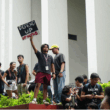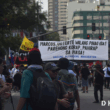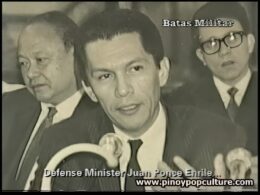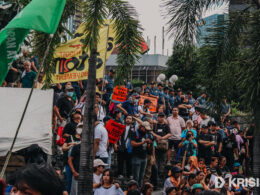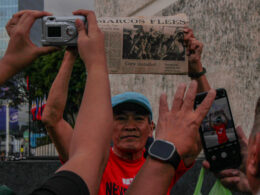Wednesday’s commemoration of the 41st anniversary of the brutal assassination of then-opposition leader Sen. Benigno “Ninoy” S. Aquino Jr. at the tarmac of the Manila International Airport, now named after him to honor his martyrdom, was almost scuttled as President Ferdinand Marcos Jr. issued Proclamation No. 665, which moved the observance of Ninoy Aquino Day to Aug. 23.
It somehow resembles a black-and-white scene. A Marcos doing away with the official state recognition of the killing of an Aquino, in the hands of agents of the elder Marcos, can speak for itself. But there is more to the proclamation and to the double-murder of Aug. 21, 1983 than the intrinsic feud between the two political clans.
Civil society leaders and organizations were correct in foregrounding the fact that the proclamation was another sinister move toward historical erasure. It is distortion par excellence.
The grand plan of befuddling the public about Martial Law histories does not come as a blitzkrieg. It comes with small cuts, with seemingly ‘benign’ actions like the sudden switch of holidays or attempts to extirpate an airport’s name.
But the actual reason behind the entire blueprint of toying with historical facts must be unfurled. The Marcos Jr. government strives to exonerate the dictator Ferdinand Marcos Sr. and his family, associates, and cronies from their crimes against the Filipino nation. It hopes to escape punishment for the shadow of abuses that marred Martial Law and the 20-year despotic regime of the president’s own patriarch.
To cast it in stone: From the official findings of the Agrava Fact-finding Board, formed by Marcos Sr. himself through Presidential Decree 1886 in October 1983, and the jurisprudence of Sandiganbayan (in 1990) and Supreme Court (in 2005), it is clear that the Marcos Sr. dictatorship had the clearest form of culpability for the Aquino assassination.
No less than the dictator’s so-called berdugo, Gen. Fabian C. Ver was implicated for Ninoy’s murder. He escaped imprisonment and possible indictment by threadbare, when he died in November 1998, a little while after the Estrada administration announced that he would face the music if he steps foot in the Philippines after years of exile.
The motive is clear. It is not just a way of getting back at their political archrival, it is a maneuver to continue confusing the public about the truth surrounding the Aquino-Galman double-murder 41 years ago to evade accountability. The whitewashing plods on with the unwarranted contravention of basic historical truths.
President Marcos Jr. did this already with the special nonworking holiday on Feb. 25, which commemorates his father’s fall from grace through the 1986 EDSA uprising. This year, it was successful in the utter obliteration of the EDSA 1 holiday. It will not be that quick for Aug. 21 because it was promulgated through Republic Act 9256, but the regime will not waver in its endeavors, subtle or otherwise, to eradicate all memorials and symbols that evoke dark memories under the Marcos dictatorship.
Yet the government has seemingly discovered a magic euphemism to conceal the real motive behind these actions: “holiday economics.” The height of irony—the same president who proclaimed Aug. 21 as the holiday to honor Ninoy was also the chief executive who introduced this very concept.
Boosting local tourism and domestic economy is not mutually exclusive with the recognition and preservation of historical memories; more often than not, these two go hand in hand. Historical and cultural preservation are surefire ways of encouraging local and foreign tourists to visit one’s country. Has this idea not come across the minds of the technocrats and other officials who work under this administration?
At the surface level, it might seem logical to move holidays to achieve longer weekends. Yet it offers a false cover.
Aside from historical contradictions, it also presents more pragmatic conversations. How about, for example, ensuring worker’s benefits during holidays? What about the personal plans that were already laid out before the sudden changes in official calendars?
Not to mention that, while moving holidays is not a violation of statutes, doing it less than six months before the actual date is flagrantly illegal. Rep. Edcel C. Lagman was in a good place to call that out.
Historical dates and holidays should not be altered on a mere Malacañang whim.
This year’s commemorations, both from government agencies and from civil society, proved that no official act or issuance from the Office of the President could dampen the fervor innate in observing this historical episode.
August 21 in the years before 2004 were not declared as holidays, but the people came out in astounding numbers, from tens of thousands to a million (in 1984), to memorialize Ninoy Aquino’s martyrdom. Last Wednesday’s activities reaffirmed that.
If the second Marcos administration is fervently bent on offering longer leeway for the Filipino working class, perhaps it must stop tinkering with historical dates and instead focus on striving to achieve a tangible economic roadmap that would provide ordinary citizens with a real and not contrived sense of holiday feeling.
Moving Aug. 21, with all its historical value and baggage, or exhorting people in bad faith to “move on” from horrid pages in its collective past will not deliver genuine holiday economics. Good governance and an equitable economic order will.



